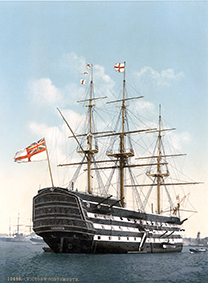For some years I have attended some of the very interesting Dorset Archaeological Days. I recall one on Eggardon Hill when a heavy mist enshrouded it. The unfortunate expert was forced to point through the mist, saying “in this direction, on a clear day one could see so-and-so, but not today”. Probably one object pointed out was the Hardy Monument, roughly south east from Eggardon, on Black Down, built in the 1840s. Its base is 833 feet above sea level and the tower is another 72 feet, so is conspicuous from sea and land. A learned elderly historian once told us that it looked like a factory chimney and went on to tell us that a ghostly Roman Legion marches over Eggardon at night and cars have been known to have ignition failures there. We believed him implicitly for he had been made an Honorary Townsman of Bridport! The monument represents a telescope, octagonal in section, tapering up to its “eyepiece” at the top, or maybe a vertical cannon, and commemorates Admiral Sir Thomas Masterman Hardy, Bart, GCB.
Not to be confused with the poet and novelist, the other Thomas Hardy, Masterman Hardy was born in 1769 at Kingston Russell House, second son of Joseph Hardy. He became a Midshipman on a 14 gun brig at twelve, returning to school in 1782. After three years he became a seaman on a Westindiaman, to reappear as Midshipman on the Hebe in 1790. By 1796 he was Lieutenant on the frigate Minerve, with Nelson as Commodore. Hardy became Captain of a brig, the Mutine and then Flag Captain of HMS Victory in 1800 and close friend of Lord Horatio Nelson. Nelson’s fleet defeated the French and Spanish fleets off Cape Trafalgar on 21st October 1805, but Nelson was mortally wounded by a snipers bullet when the ships were in close conflict. It was then that Hardy held him in his arms and Nelson uttered the well-known phrase “Kiss me, Hardy”, although some have preferred to think it was “Kismet, Hardy”. In The Trumpet Major by the other Thomas Hardy, a seaman from HMS Victory said “The Cap’n (Hardy) had a narrow escape—a shot shaved his ankle like a razor” and his shoe buckle was carried away by a shot. The Captain is described as wearing a blue uniform with gilt epaulettes and a cocked hat and sword. On returning to his family home, a small manor house at “Pos’ham”, he stayed with his sisters.
Admiral Hardy became Governor of Greenwich Hospital in 1834 where 2,000 Naval pensioners lived. He died there in 1839 and the monument to him was built of local stone near his home at Portesham by public subscription. £609 was raised in the 1840s and the foundation stone was laid in 1844 by the wife of John Floyer, MP for Dorset and High Sheriff. The tower was designed by Arthur Dyke-Troyte and contains a spiral staircase to a viewing platform on top and has narrow slit windows in its walls. It is possible to park nearby, to see the monument or view the surrounding countryside and seascape, from the Isle of Wight to Start Point in the west.
The news of the Trafalgar victory and the death of Nelson was conveyed by the schooner Pickle, a lightly armed despatch vessel to Falmouth in Cornwall arriving on 4th November, having sailed on 26th October from Trafalgar. Lieutenant John Richard Lapenotiere drove a post-chaise and four the 270 miles to London in about 36 hours, arriving at 1am on 6th November, stopping at coaching inns to change horses 21 times. In our area the inns were at Honiton, Axminster, Bridport (The Bull), Dorchester and Blandford. This drive is now commemorated in the “Trafalgar Way”, with plaques displayed on the inns. Lapenotiere was born in Ilfracombe in 1770, promoted to Commander following Trafalgar and to Captain in 1815 and died in Cornwall in1834. He came from a Huguenot family.
William Hill in Dorset Men at Trafalgar tells of two other Dorset men who were Captains at Trafalgar, Henry Digby on HMS Africa and Charles Bullen on HMS Britannia. Digby was the eldest son of the Hon. William Digby, the family holding estates in Sherborne from the 17th century, after Raleigh. He became Captain of HMS Africa in 1805, after earning much prize money by capturing two Spanish ships. At Trafalgar his little ship fought valiantly and he received more prize money, leaving the ship in 1806 to marry and settle down, inheriting the family estate at Minterne. He did not serve at sea again but was automatically promoted to Admiral in 1841 and died in 1842. Bullen had connections with Weymouth and the Devon border and entered the Navy in 1779 as a 10 year-old volunteer. He rose through the ranks in several ships, eventually becoming Flag Captain on HMS Britannia, retiring as Commodore, to live at Burton Bradstock. Like Digby he was automatically promoted finally to Admiral aged 85, to die the next year.
Bridport History Society meets on November 10th to hear from Committee Member Jane Ferentzi-Sheppard on “Where did Dorset people go?—Migration from Dorset through the ages”
Cecil Amor, Chairman, Bridport History Society:
Tel . 01308 456876.








